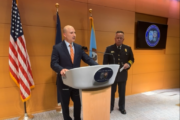The transition from high school to college can be a challenge for some students, and it also requires an adjustment from parents.
“They go from having access to everything to having access to either nothing or what the child will allow their parents to see,” says Stephanie Jerstad, an assistant professor in the department of criminology, sociology and anthropology at Millersville University of Pennsylvania.
Parents of prospective college students should be aware that the standards, policies and expectations of teacher-to-parent communication are vastly different at the college level than at the high school level.
In college, it becomes the student’s right to decide who sees their educational records. And parents are generally discouraged from communicating with professors on behalf of their children, outside of a few special circumstances.
[READ:4 Changes That Parents of College Applicants Need to Know]
“The classroom is between a community of adults who are learning together,” says Paul Musgrave, assistant professor of political science at the University of Massachusetts–Amherst. “I want to work with the people who are in my class, and I want to hear from them if there’s problems.”
This is a significant shift from the K-12 level, Musgrave says. Learning management systems give some parents of K-12 students 24-hour access to their child’s grades, attendance and discipline records, cafeteria spending and other educational information.
In some cases, parents are also logged in to their student’s online classroom system as a way to further monitor their progress and assignment due dates. Regular communication between parents and school officials, such as teachers and administrators, is often encouraged at the K-12 level, especially if there’s an issue regarding academics or behavior.
College communication procedures can be an especially difficult change of norms for immigrant families or parents of first-generation college students, who often are not as well versed in the expectations and structure of college. Professors and university officials are generally more understanding in those cases, says Susana Muñoz, associate professor and coordinator of the Higher Education Leadership doctoral program at Colorado State University.
It’s important for parents of prospective college students to know what most professors consider appropriate and inappropriate communication, as well as the situations where contact is and isn’t welcomed.
When and Why Parents Should Communicate With Professors
Professors are fine with parents reaching out to send a simple note of thanks or to ask about their specialty, especially if they’re in a similar field and simply want to talk shop. Introducing parents to professors during parents weekends is also welcomed by some instructors, but professors generally prefer to limit parent communication to specific circumstances. Here are two examples.
Their Student Signed a FERPA Waiver
Under the federal Family Educational Rights and Privacy Act of 1974, commonly known as FERPA, parents can’t access certain information about their student without written permission. This is often the first thing professors look for when contacted by parents. If a student hasn’t signed a waiver, professors are under no obligation to release information and generally are prohibited from doing so. Even in situations where students have signed a waiver, Musgrave says he prefers to deal with the issue in his classroom.
Professors can also use discretion on which exempted information they choose to release to parents.
“Oftentimes, when you get a call out of the blue, you assume this parent is calling you because they care about this student,” Muñoz says. But “we don’t know the whole story or background of that family. We really have to be careful about what we divulge and the kind of information that we give out.”
If There’s an Academic Accommodation or Health Emergency
Jerstad recalls reaching out to a student with a medical condition who hadn’t shown up to class for several weeks. The student’s mother responded, informing her that the student was in the hospital. Together they devised a plan to help the student get what she needed for class and succeed, despite being away.
Another student was delayed academically and needed accommodations in order to succeed in class. While the onus is on students to reach out on their own in college regarding accommodations, Jerstad says she welcomes input from parents in those circumstances.
“For both of those parents, I felt like it was a good thing for them to reach out to me, so that they can help their child,” she says.
Why Parent Communication With Professors Is Discouraged
In many cases, parents are footing at least part of the college bill, and it’s natural for some to want to have ownership in their child’s education. Professors encourage plenty of dialogue between parents and students regarding their educational pursuits, but a parent carrying that conversation into an email or phone call to a professor could be detrimental to the student, experts say.
It Can Be Uncomfortable for Students
“I never judge a student by what their parents do,” Musgrave says. “It’s annoying, but it’s not (the student). The secret is you’ve got to keep the relationship in terms of you as a faculty member and the students. That is actually the secret to everything.”
[READ: 7 Guidelines for College Student-Professor Interactions.]
Even if done respectfully, a parent contacting a professor could embarrass the student, especially if it becomes combative, experts say. Ewell says if a parent tried to contact him, he would assume it was without the student’s knowledge, “and honestly, I would feel bad for the student.”
That’s where parents would be crossing the line, Jerstad says.
“I almost look at it as manipulation by the parent, who discreetly reaches out to the professor without the student knowing,” she says. “To me, it would make me more upset toward the parent.”
It Hinders Growth as an Independent Adult
Students aren’t just pursuing a degree in college, Musgrave says, they’re going through a learning and maturing experience that sets them up for the rest of their life.
“I think the biggest thing is the student would be missing out on the ability to negotiate difficult and uncomfortable situations,” he says. “Facing into uncomfortable situations sucks, everybody hates them, and it’s inescapably a part of maturity. You just can’t outsource those things.”
Muñoz has a daughter in college, and she says even though she’s a college professor herself, she takes a hands-off approach and encourages her daughter to resolve issues on her own directly with professors.
Being alone at college is the ideal time to learn responsibility, says Patrick Ewell, an associate professor of psychology at Kenyon College in Ohio. A parent stepping in to fix things could undermine that growth, he says.
“You helped your child get to college so they can turn into an adult,” he says. “That’s not going to happen if you are trying to protect them from failure. Ask how their classes are going, which is hardest and which is easiest, what they are interested in, etc. Support them the best you can and then give them advice on what you would do. Other than that, parents would do best to let professors be.”
Searching for a college? Get ourcomplete rankingsof Best Colleges.
More from U.S. News
Campus Support Every First-Year College Student Should Use
Why Undergraduate Research Matters in College
Don’t Make These 8 Mistakes as a College Freshman
Should Parents Contact College Professors? originally appeared on usnews.com







